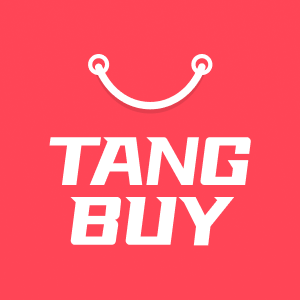Biodegradable Poop Bags and the importance of wholesale options for Canadian retailers
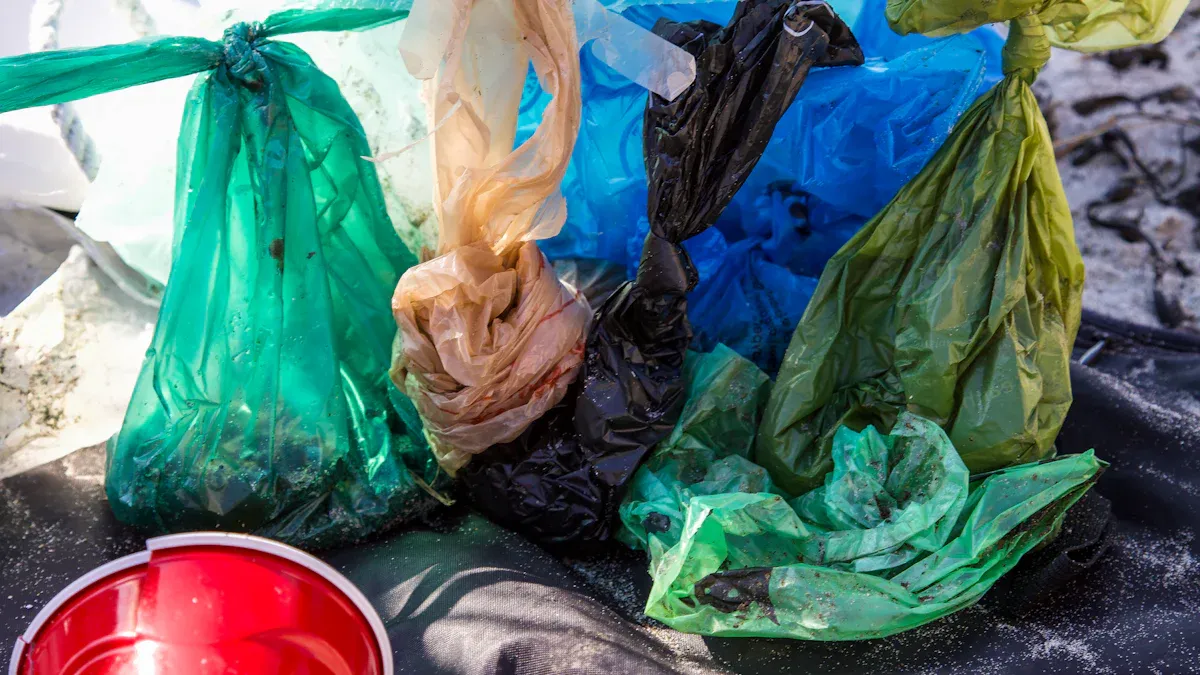
You may have seen more people wanting eco-friendly pet waste bags. The Canadian market for dog waste tools is already worth USD 1.2 billion. It is expected to more than double by 2033. Look at how much it will grow:
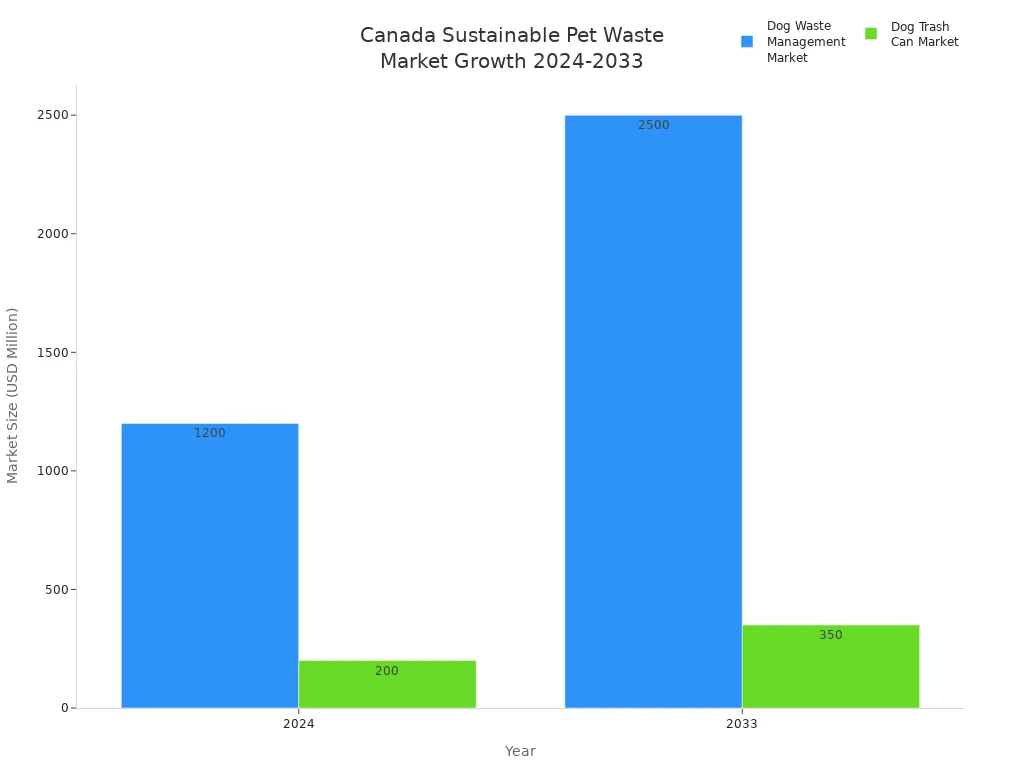
Metric | Value | Timeframe |
|---|---|---|
Dog Waste Management Market | USD 1.2B | 2024 |
Forecasted Market Size | USD 2.5B | 2033 |
CAGR | 8.9% | 2026-2033 |
More people own pets now. There are also stricter rules about cleaning up after pets. This makes people choose sustainable and eco-friendly products. Selling biodegradable poop bags shows you care about the environment. It also helps you join a fast-growing market.
Key Takeaways
Biodegradable and compostable poop bags help cut down plastic waste. They also help keep the environment safe.
Certified compostable bags break down fully in special compost places. Some biodegradable bags do not break down all the way. They can leave tiny bits of plastic that are bad for nature.
Buying poop bags wholesale saves money for shops. It also makes sure they always have enough bags. This helps shops meet more customer needs.
Shops look better when they sell eco-friendly products. They can also teach customers how to throw away bags the right way.
Look for trusted certifications like BPI, BNQ, or TUV OK Compost. These show the bags are really good for the environment.
How you throw away compostable bags depends on local rules. Always check what your city will take.
Pick bags that are strong and do not leak. Good packaging and help from suppliers are good for shops and buyers.
Changing to eco-friendly poop bags means checking what you have in stock. You need to train workers and work with good wholesalers.
Why Choose Biodegradable Poop Bags

Consumer Demand
Many customers now want eco-friendly products. People in Canada care about nature. They want to make good choices for their pets. Selling biodegradable poop bags shows you listen to your customers. Pet owners want products that break down safely. They do not want to hurt the environment. Cleaning up after dogs should feel good. If you sell biodegradable options, you help them do this.
Did you know? More than half of Canadian pet owners like eco-friendly pet waste solutions. This number goes up every year.
Brand Image

Your shop’s reputation is important. Using biodegradable poop bags shows you care about the planet. Customers remember shops that help the environment. You can be different from other shops by selling eco-friendly products. This helps people trust your shop. They may come back again and again.
Show your green actions on social media.
Put up signs in your shop to show you care.
Run special deals for eco-friendly products.
These steps help your shop look good. People will see you as a smart and caring retailer.
Regulations

Canada is working to stop single-use plastics. The government wants less plastic waste by 2025. Most rules are about plastic bags, cutlery, and straws. But there is more talk about compostable and biodegradable choices. Pet waste bags are not banned yet. New labelling rules are coming soon. Only products that meet strict rules can say “biodegradable” or “compostable” on the label.
Here is a quick look at the rules:
Regulation/Initiative | Scope | Relevance to Biodegradable/Compostable Pet Waste Bags |
|---|---|---|
Single-use Plastics Prohibition Regulations (SUPPR) | Ban on six types of single-use plastics like checkout bags, cutlery, straws, stir sticks, ring carriers, and some food service ware | No mention of pet waste bags; focus is on foodservice and common single-use plastics |
Plastic Labelling Requirements (in development) | Will need correct labelling for recyclability and compostability; will not allow words like “biodegradable” or “degradable” unless they meet standards | Will control words on packaging, which could affect pet waste bags if labelled that way |
Provincial regulations | Different in each province, but no special rules found for biodegradable or compostable pet waste bags | No direct provincial rules found |
Watch for these changes. If you sell biodegradable poop bags that meet the rules, you will be ready. You will not have trouble with new laws. Picking certified eco-friendly products now can help you later.
Environmental Impact of Plastic Bags
Waste in Canada

You see plastic everywhere in Canada. Pet waste bags add to this problem. Every time you use a plastic bag for your dog, you create more rubbish. Most of these bags end up in the bin. They do not get recycled. Recycling centres often refuse plastic bags because they clog machines. So, these bags pile up in landfills or escape into nature.
Plastic bags can take about 20 years to break down in the environment.
Some plastics, like PET bottles, can last up to 450 years in landfills.
Even biodegradable bags need special conditions to break down. If you throw them in the regular bin, they may last as long as normal plastic.
Many Canadian cities want to reduce plastic waste. Some places have banned certain plastics. British Columbia, for example, does not allow compostable plastics in composting bins. These bags go to landfill instead. You might think you are making a green choice, but the system does not always support it.
Landfill Effects

When you toss a pet waste bag in the bin, it usually ends up in a landfill. Landfills are not good places for plastic or biodegradable bags. The air is limited, so things break down very slowly. Even bags made from plant-based materials can stay there for decades.
Dog waste in landfills creates another problem. It breaks down without oxygen, which produces methane. Methane is a strong greenhouse gas. It traps heat in the atmosphere and speeds up climate change. Some cities, like Vancouver, have tried new ways to handle dog waste. They have tested flushing it to sewage plants. This helps reduce methane, but it is hard to separate the waste from the bag. Most bags still end up buried.
Tip: If you want your biodegradable bags to break down, look for local composting programmes. Not all cities accept these bags, so check before you buy.
Wildlife Risks

Plastic bags do not just disappear. They can harm animals and nature. When bags escape into rivers or parks, animals can eat them or get tangled. This can hurt or even kill wildlife. The Canadian Wildlife Federation warns that single-use plastics, including pet waste bags, threaten animals and ecosystems.
Bags break down into tiny pieces called microplastics.
Scientists have found microplastics in fish, birds, and even human bodies.
Recycling does not solve the problem, as most facilities do not accept plastic bags.
Switching to biodegradable bags can help, but only if you dispose of them the right way. You need to follow local rules and use proper composting. This reduces the risk to wildlife and keeps nature cleaner for everyone.
Biodegradable Poop Bags: What to Know
Materials Used
When you buy biodegradable poop bags, you might wonder what is inside them. Most brands in Canada use plant-based bioplastics. Many bags are made from corn starch or vegetable oils. Some use other plant starches too. A few companies use compostable polymers or plant-based biopolymers. These materials help the bags break down faster than normal plastic. Some brands, like Collar of Sweden, use only biodegradable and compostable materials. Others, like Earth Rated, mix recycled plastics with new plastic. You might see bags made from HDPE or LLDPE. These are types of plastic, but some have recycled content to cut down waste. If you want the greenest option, pick bags made from corn oil or other renewable sources. These bags often meet strict compostability standards.
Tip: Always read the packaging for material details. Some bags look green but still have regular plastic inside.
Certifications
You want to make sure your biodegradable poop bags really work. Certifications help you know this. In Canada, trusted certifications are BPI and CMA approval. These show the bags break down in commercial composting systems. You might also see the BNQ certification. This is a Canadian mark that means the bag passed tough compostability tests. The Compostable Bags Certification Program, run by the Composting Council of Canada and BNQ, gives a special Mark of Conformity. If you see this on a pack, you know the bag is safe for home composting. Some bags also have the TUV OK Compost Home label. This is another sign of good quality.
Here is a simple table to help you spot the right certifications:
Certification | What it Means | Where It Applies |
|---|---|---|
BPI | Breaks down in commercial composting | North America |
BNQ | Meets Canadian compostability standards | Canada |
TUV OK Compost Home | Safe for home composting | International |
Breakdown Process
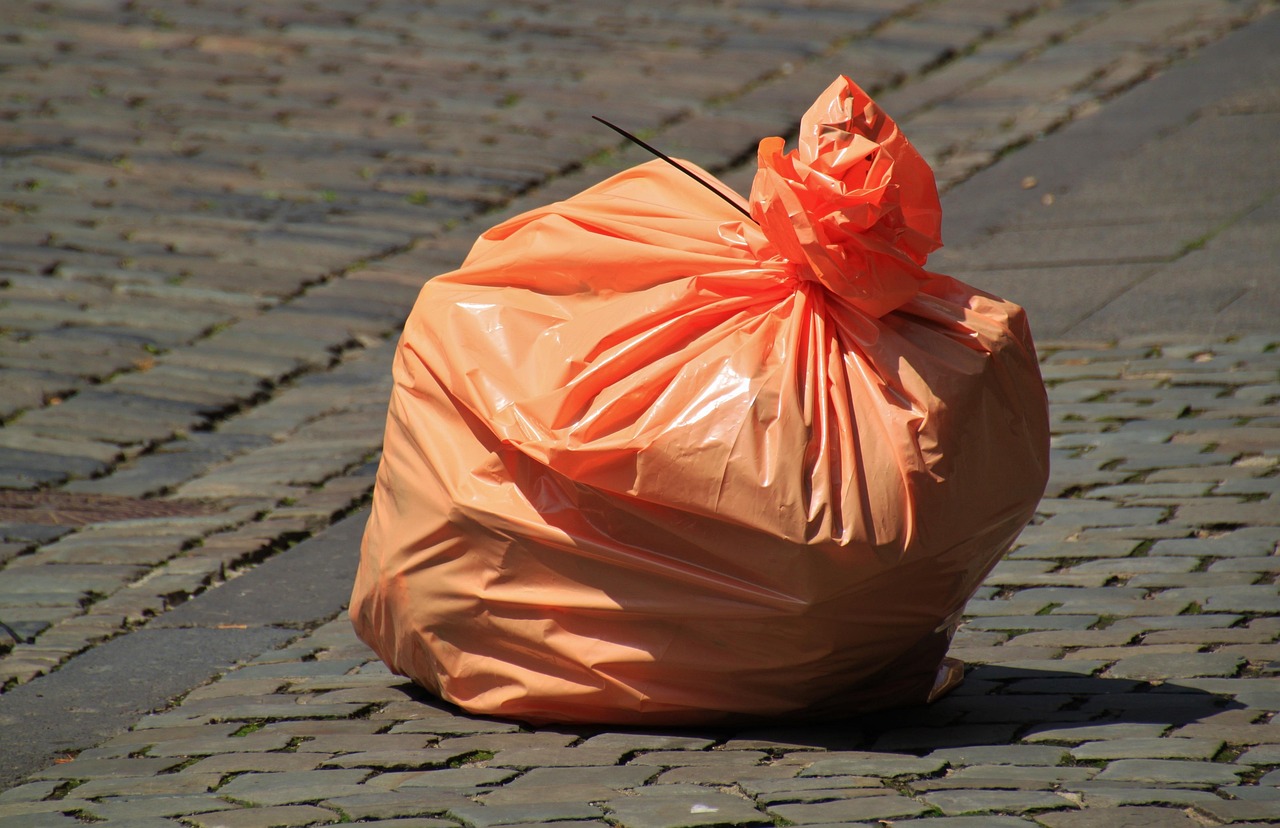
You might think all biodegradable bags break down fast, but it depends on the material and where you throw them away. In a commercial composting place, certified compostable bags usually break down in about 12 weeks. These places keep the temperature high, above 60°C. They add water and have lots of microbes to help. If you try to compost these bags at home, it takes much longer. Home compost bins are cooler and not as controlled. Starch-based bags can lose most of their mass in three to six months. Some materials, like PLA, hardly break down at all at home. That is why you should always check if your local composting programme accepts biodegradable poop bags.
Note: For best results, use certified bags and follow your city’s composting rules. This helps the bags break down fully and keeps the environment safe.
Compostable Doggie Bags vs Biodegradable

Key Differences
You might wonder how compostable doggie bags are different from biodegradable ones. The biggest difference is in how they break down and what is left after. Compostable doggie bags, with certifications like BPI or ASTM D6400, break down fully in special composting places. They turn into water, CO2, and humus, which is good for soil. These bags use PBAT and PLA. These materials make the bags strong and stop leaks, but still let them compost safely.
Biodegradable bags can be confusing. In Canada, "biodegradable" does not have a clear meaning. Some bags called biodegradable, like oxo-biodegradable types, only break into tiny pieces called microplastics. These small bits can stay in nature and hurt animals. Biodegradable bags do not always break down safely or fully. Canadian rules focus on compostable doggie bags because they break down all the way and are safe.
Feature | Compostable Doggie Bags | Biodegradable Bags |
|---|---|---|
Breakdown Time | 10–45 days (in composting) | 6 months–1,000 years |
End Product | Water, CO2, humus | Microplastics, residue |
Certification | BPI, ASTM D6400, TUV OKCompost | Rarely certified |
Environmental Impact | No toxic residue | Microplastic pollution |
Disposal Methods
Getting rid of compostable doggie bags and biodegradable bags is not the same. In many Canadian cities, you can put certified compostable doggie bags in the green bin with food scraps. But you should always check your local rules first. Some places let you put compostable dog waste bags in city compost bins. This keeps plastic out of landfills. Not every city has this, so you need to check your area’s rules.
Most biodegradable bags are not allowed in compost or recycling bins. They usually go in the normal rubbish, where they do not break down well. Even compostable doggie bags will not break down in a landfill. There is not enough air or heat. If you have a garden, you might think about composting at home. But it is not safe for dog waste because of germs. Some people build backyard digesters, but these are tricky and not common.
Tip: Always look for certifications like BPI or TUV OKCompost on compostable doggie bags. This helps you know they are safe for composting if your city allows it.
Pros and Cons

Picking between compostable doggie bags and biodegradable bags can be hard. Here is a quick look at the good and bad points:
Compostable Doggie Bags
✔️ Break down fully if composted the right way.
✔️ Help Canada cut plastic waste by 2030.
✔️ Make humus that is good for soil.
❌ Need special composting places, which are not everywhere.
❌ If put in landfill, they can last over 100 years and may make methane.
Biodegradable Bags
✔️ Sometimes cost less and are easy to find.
❌ Do not always break down fully, especially in landfills.
❌ Can turn into microplastics, which hurt nature.
❌ Often do not have clear disposal rules or trusted certifications.
If you are a retailer, compostable doggie bags are a greener choice. They match Canada’s environmental goals. They help your shop look responsible. But you need to teach your customers how to throw them away the right way. Biodegradable bags might seem easier, but they can cause more problems for the planet and your business.
Wholesale Options for Retailers
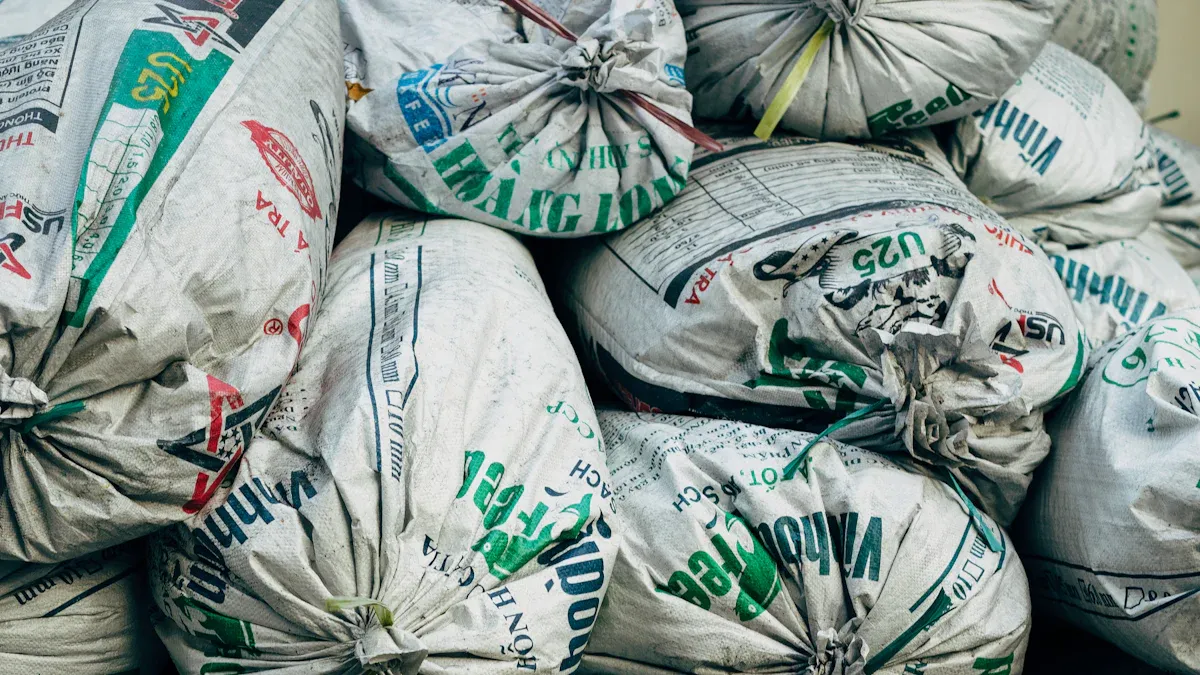
Cost Savings
When you buy in bulk, you save money. Wholesale prices are much lower than buying single packs. This means you can offer better prices to your customers and still make a good profit. If you run a pet shop or manage eco-friendly dog waste stations, you know how quickly these bags get used. Buying wholesale helps you keep costs down.
Here’s a quick look at how wholesale can help your budget:
Purchase Type | Cost per Bag | Total Bags | Savings (%) |
|---|---|---|---|
Retail (small pack) | $0.20 | 100 | 0% |
Wholesale | $0.08 | 2,000 | 60% |
Tip: Always ask your supplier about discounts for larger orders. Some will give you extra deals if you buy more than one product, like dispensers for eco-friendly dog waste stations.
You can use the money you save to improve your shop or offer new products. Lower costs also let you run special promotions. Customers love a good deal, and you get more people coming back.
Supply Consistency
You never want to run out of stock, especially if you have regular customers or manage public spaces. Wholesale options give you a steady supply. You can plan ahead and order enough bags for busy months. This is very important for places with eco-friendly dog waste stations. If you run out, people might leave waste behind, which is bad for your reputation.
Set up a regular delivery schedule with your supplier.
Keep a small backup stock in case of delays.
Track how many bags you use each month.
When you have a reliable supply, you worry less. You can focus on helping your customers and keeping your business running smoothly.
Meeting Demand
Pet ownership keeps growing in Canada. More people want eco-friendly options for their pets. If you only buy small amounts, you might not keep up with demand. Wholesale lets you meet the needs of all your customers, even during busy times like holidays or summer.
You can also offer more choices. Some customers want scented bags, others want extra-strong ones. With wholesale, you can stock different types and sizes. This makes your shop or your eco-friendly dog waste stations more useful for everyone.
Note: When you meet demand, you build trust. People know they can count on you for the products they need.
Buying wholesale is not just about saving money. It helps you stay ready, serve your customers better, and grow your business in the eco-friendly market.
Choosing the Right Supplier
Product Features
When you pick a supplier for dog waste bags, you want products that work well and make your customers happy. Look for bags that are strong and do not tear easily. You do not want leaks or messes. Bags should feel good to the touch and be easy to open. Many Canadian retailers like bags that come in handy sets, such as 8 rolls with 120 bags each. This makes it simple for you to stock your shelves and for customers to grab what they need.
Here are some features you should look for:
Bags that break down in about 12 weeks and leave no harmful bits behind.
Tear-resistant and waterproof design for daily use.
Packaging made from recycled paper to show you care about the planet.
Bioplastic materials instead of oil-based plastics.
Leak-proof performance and a pleasant feel, based on customer reviews.
Options for scented bags, like lavender, to help with odours.
Tip: Choose bags that meet the EN 13432 compostability standard. This shows you offer products that are safe for the environment.
Certification Checks
You want to make sure the bags you sell are truly eco-friendly. Always check for certifications on the packaging. Trusted marks like BPI, BNQ, or TUV OK Compost mean the bags meet strict rules for breaking down safely. These labels show the bags will not harm the soil or water when they decompose. If you see these certifications, you can feel confident about what you are selling.
A quick table to help you spot the right certifications:
Certification | What It Means |
|---|---|
BPI | Breaks down in commercial composting |
BNQ | Meets Canadian compost standards |
TUV OK Compost | Safe for home composting |
Note: Some suppliers may claim their bags are biodegradable, but without proof, you cannot be sure. Always ask for certificates or test results.
Supplier Reliability
You need a supplier you can trust. Reliable suppliers follow the latest rules and provide proof that their bags are safe for the environment. They should give you clear information about how the bags break down and what happens after disposal. Good suppliers also keep up with trends, like offering bags with different scents or sizes.
Look for these signs of a reliable supplier:
They meet recognised biodegradability standards and have the paperwork to prove it.
They offer bags that are strong, leak-proof, and easy to use.
They provide extras, such as dispensers or different bag sizes.
They respond quickly to your questions and deliver on time.
They understand what Canadian customers want and adjust their products to match.
If you find a supplier who ticks all these boxes, you can build a strong partnership and keep your customers happy.
Making the Switch
Inventory Review

To start using biodegradable or compostable dog waste bags, first check what you already have. Look at your shelves and storage areas. Write down all the dog waste bags you sell. See if any are plastic bags that do not follow new eco-friendly rules. You might find some old bags that need to go.
Here’s an easy way to check your stock:
Count every dog waste bag in your shop and storage.
Sort them into groups: plastic, biodegradable, or compostable.
Look at expiry dates and check for certifications on the packaging.
Choose which bags to keep and which ones to stop selling.
Tip: Use a spreadsheet or an app to track your stock. This makes it easier to see what you need to order next.
Staff and Customer Education
Your staff should know why you are changing to eco-friendly bags. When they understand the benefits, they can help customers better. Training your team does not have to be hard. Companies like EcoSafe Zero Waste have guides, FAQs, and training for shops. These tools explain how compostable bags work and how to use them.
You can help your staff and customers learn by doing these things:
Share guides and FAQs from trusted suppliers.
Hold a short training session with videos or printed guides.
Put up signs in your shop about the benefits of eco-friendly bags.
Give tips on using bag holders to make clean-up easier.
Teach staff to talk about the problems with plastic bags and why compostable bags are better.
Customers often want to know the difference between biodegradable and compostable bags. Make sure your staff can explain this clearly. Posters or leaflets can also help spread the message.
Partnering with Wholesalers
Choosing the right wholesaler makes switching much easier. Good wholesalers give you bulk prices, steady supply, and support for your shop. They may also offer tools like bag size calculators and info about local rules. Some even help you start eco-friendly programmes in your shop or area.
When picking a wholesaler, look for these things:
Products with clear labels and proof they are compostable.
Training and support for your staff.
Order sizes that fit your shop’s needs.
Fast delivery and helpful customer service.
If you work well with your wholesaler, you will always have the right bags. Your shelves will stay full, your customers will be happy, and you will help the environment.
Using compostable doggie bags helps lower plastic waste. It also keeps landfills cleaner for everyone. More people want eco-friendly products now. Canadian shoppers trust shops that sell compostable doggie bags. This makes your shop look good and ready for new rules. Buying wholesale means you pay less and always have enough bags. Trusted suppliers like Discount Dog Poop Bags or Earth Rated are good choices. Picking compostable doggie bags helps your business and the planet. You can make a big difference by switching today.
FAQ
What makes a poop bag biodegradable?
Biodegradable poop bags use plant-based materials. These break down faster than regular plastic. You help the planet when you choose them. Always check for certifications on the packaging.
Can I compost dog waste at home?
You should not compost dog waste at home. Harmful germs can survive in your garden compost. Use city composting programmes if they accept pet waste. Always check local rules first.
How do I know if a bag is truly compostable?
Look for trusted certifications like BPI, BNQ, or TUV OK Compost. These marks show the bag will break down safely. If you do not see a label, ask your supplier for proof.
Are biodegradable bags safe for wildlife?
Biodegradable bags break down faster than plastic. This helps protect animals from eating or getting tangled in bags. You still need to dispose of them properly to keep wildlife safe.
Do all Canadian cities accept compostable doggie bags?
No, not every city accepts compostable doggie bags in green bins. Some places send them to landfill. Always check your city’s composting rules before you buy or use these bags.
Why should I buy poop bags wholesale for my shop?
Buying wholesale saves you money. You get a steady supply and can meet customer demand. You also offer better prices and more choices. Your shop looks reliable and eco-friendly.
How should I store biodegradable poop bags?
Keep bags in a cool, dry place. Heat and sunlight can make them break down early. Use older stock first. This keeps your bags strong and ready for customers.
What is the difference between compostable and biodegradable bags?
Compostable bags turn into soil in special composting places. Biodegradable bags just break into smaller pieces. Compostable bags are safer for the environment. Always check for certifications to be sure.

TangBuy: A Smarter Way to Dropship in 2025
If you're looking to stay competitive with dropshipping in 2025, speed and trend-awareness are key. TangBuy helps you stay ahead with real-time product trends, fast fulfilment, and factory-direct sourcing. With over 1 million ready-to-ship items, 24-hour order processing, and seamless Shopify integration, TangBuy makes it easier to test, scale, and succeed in today's fast-moving eCommerce landscape.
See Also
Advantages Of Ordering Pet Toys Wholesale Without Minimum Limits
Ways Personalised Aprons Wholesale Enhance Dropshipping Success Rates
Leading Wholesale Suppliers For Baby Shower Essentials In 2025
Sourcing Party Supplies Wholesale From Reliable Vendors For Profit
Deciding Between Dropshippers And Wholesalers For Your Enterprise
